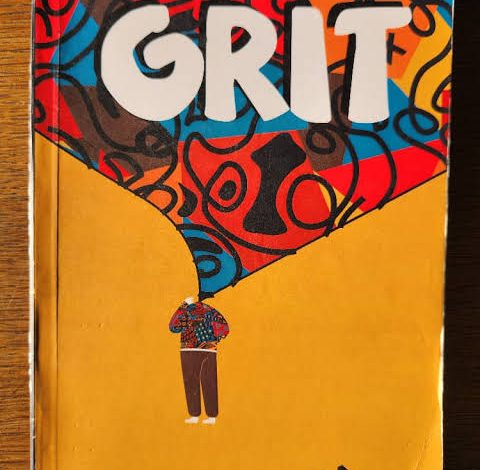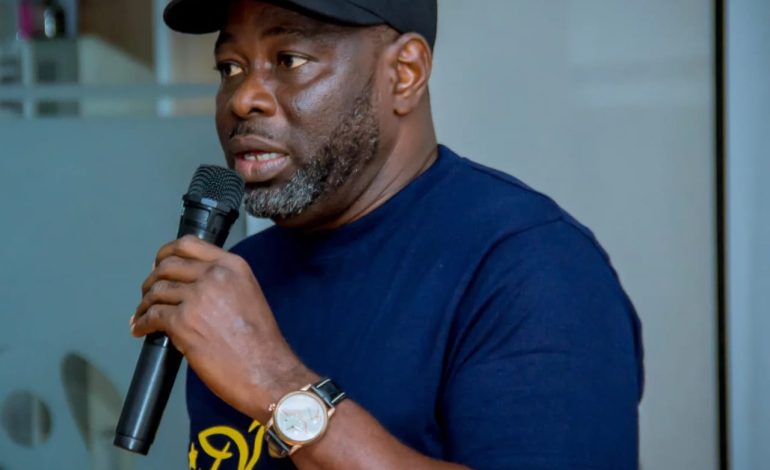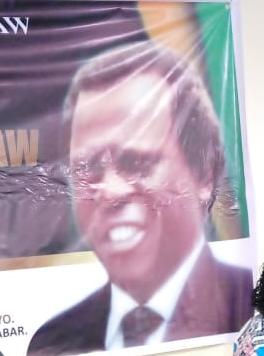A call for action: How a family’s betrayal by political rascality mirrors a nation’s dilemma in Gomba’s ‘Grit’

By Anote Ajeluorou
OBARI Gomba’s 2018 play Guerrilla Post went for the jugular in dealing with the state’s use of brute force against those who directly challenge it as the rulers badly rule the people to their political and economic ruins. This year Gomba’s sight is also set on the political turf, but in a more subtle, indirect, nuanced manner that just about indicts everyone, even the bystanders who are inexorably drawn into the political whirlpool. But rather than take on the larger political scene in Grit (Hornbill House of the Arts, Lagos; 2023), Gomba zeroes in on a family and its involvement in politics that ends up disrupting Pa Nyimenu family dynamics, as his two sons Oyesllo and Okote tangle in family and political supremacy. Of course, this collision has wide-ranging implications for the Sonofa community whose inhabitants bare their fangs against the Nyimenu family in a war of attrition.
Between Pa Nyimenu’s scion Oyesllo and his adopted son Okote, there’s no love lost any more after they return from serving their country as soldiers. Oyesllo went to serve without the benefit of a university education while Okote joined the army as a medical doctor, a fortune that infuriates Oyesllo, especially as Okote’s respect for his elder brother begins to wane, with spite and hate becoming the lot of the two brothers for each other. This will soon spill over into Sonofa community as Oyesllo pitches tent with the hated Democratic People’s Alliance known for misgovernance, a party also responsible for Oyesllo’s mother’s death, a prominent market leader who died while fighting for the people. On the other hand, Okote is being wooed by the market women to join the political fray, in the memory of his late adopted mother, just as United Progressives Party is also wooing him to be its flagbearer to challenge his own brother. Pa Nyimenu’s intervention to keep the two brothers’ political interests apart proves futile.
This is the explosive, combustive political context in which the audience is introduced to Pa Nyimenu’s compound and family, as the rivalry between his two sons spirals into the community and ultimately out of control. But there’s a tripartite, sinister plot afoot among a section of Sonofa community to pit the Nyimenu sons against each other with a view to eliminating them and paving the way for the emergence of other contending forces. Only Pa Nyimenu gleans this dark cloud hanging over his family almost too late before springing into action, both to save his sons and Sonofo as a community from its self-destructive path.

Gomba’s Grit can best be understood in the context of political symbolism, with Pa Nyimenu representing both a troubled nation and her blighted people on whom all manners of political rascality and betrayals are perennially visited. The two political parties promise heaven and earth but deliver nothing, especially the Democratic People’s Alliance. United Progressives Party is jostling to upstage it with purported good intentions by bringing in a supposedly good man, Okote, but there’s already sabotage of its own processes from within, as it enters into unholy alliance with its rival party just to deal with Pa Nyimenu and everything he represents. By this unholy alliance of dark forces by the two parties, the market women and the youth are conscripted into committing evil against Pa Nyimenu, who is both symbolic of a blighted nation and her hapless people through the conspiracy of the political parties and their actors.
Pa Nyimenu’s travail is symbolic. Nigeria and Africa’s political parties are in the conspiracy business of undermining and subverting democratic norms for personal, sinister gains. Indeed, Gomba’s Grit explores and exposes the underbelly of Africa’s political parties set up by sponsors whose sole intention is to work against the interests of the nation and her people for their personal greed. It is why participatory democracy has remained an anomaly on the continent, and has simply morphed into a mere ‘electocracy’ instead, since all known democratic ideals are subverted with periodic electoral rituals being what pass for democracy that ultimately sabotages the people’s yearning for good governance.
However, Pa Nyimenu soon comes to understand what is at play and mobilises his own counterforce to upend the evil massed against him. But this is hardly so in real Nigeria’s, nay Africa’s political life. The people are usually divided along the fault lines of poverty, tribe, religion and ultimately too docile to act decisively on behalf of self; they only grumble at the miserable crumbs the operators of warped democracies throw at them. But in Gomba’s Grit, Pa Nyimenu shows that there’s hope and demonstrates uncommon grit, as he comes to grips with the reality of his family betrayal, and rises to serve the political saboteurs their own vinegar. A man with an activist past, Pa Nyimenu reaches back into his old ways to grapple with the tragedy about to hit his family. He deploys equally revolutionary brute force that matches what awaits his two sons, and will not take prisoners of those plotting his downfall.
In fact, Gomba’s Grit is a call to ‘arms’ against Nigeria’s, nay Africa’s political traducers, not in the recent manner of a rash of coups in French African countries, but through decisive political action. The exploited electorate, represented by Pa Nyimenu in Grit, takes matters into his own hands to redeem himself from the political wolves and the serial betrayal perennially served him by those who aspire to public office. Even the women, who champion good governance, are betrayed by their women leader, who is on a vengeful, personal mission. It mirrors how the quest for good governance is sabotaged by certain powerful, diabolical forces desperate for the continuity of the status quo. How then can the people muster their political capital like Pa Nyimenu and make it count against operators of Africa’s deformed democracies that it will no longer be business as usual, but that serving the entire populace the dividends of democracy is why they are elected into office?
This is the crust of Gomba’s futuristic, inward-looking, revolutionary play Grit that exposes the underbelly of Africa’s political systems that are devoid of altruistic motives, but steeped instead in the service of self to those who triumph in questionable electoral victories that are obviously an open rape of democratic norms and institutions. Gomba’s play is a gritty political statement on the insidious political conditions in Africa with even a glimmer of redemption always cast in abeyance in service of some dark, malevolent gods of power.
Gomba’s Grit is in the shortlist for The Nigeria Prize for Literature 2023 which prize award is scheduled for October 13, 2023.



